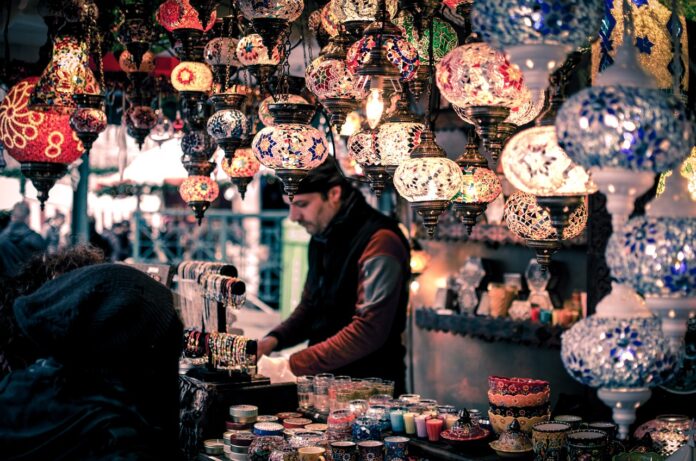Saudi Cultural Week, held from Sept. 27 to Oct. 1 in Athens, Greece, highlighted the Kingdom’s vibrant cultural heritage through culinary, artistic, and historical exhibits.
Saudi Arabia’s Ministry of Culture organized the Saudi Cultural Week in Athens, Greece, from September 27 to October 1, 2024, offering visitors a deep dive into the Kingdom’s traditions, customs, and artistic heritage. The event featured a wide range of activities, all aimed at showcasing Saudi Arabia’s rich culture across various creative industries, from culinary arts to fashion and music.
Abdulrahman Almutawa, spokesperson for the Ministry of Culture, emphasized the event’s goal of introducing Saudi culture and heritage to the international community. He highlighted the involvement of Saudi Arabia’s Culinary Arts Commission, which prepared traditional dishes and Saudi coffee for attendees, reflecting the authenticity and hospitality for which the Saudi people are known.
Embed from Getty ImagesThe Libraries Commission displayed rare Arabic and Islamic manuscripts, offering visitors a chance to experience the beauty of Arabic calligraphy. This was in collaboration with the Prince Mohammed bin Salman Global Center for Arabic Calligraphy, and talented Saudi calligraphers presented their intricate work, demonstrating the artistry of the script.
The Fashion Commission also took part by showcasing traditional Saudi garments and hosting an exhibition that highlighted the creativity of Saudi designers. The fashion display emphasized the unique aesthetics of Saudi traditional attire, while Saudi short films were also screened as part of the event’s cultural offerings.
The Music Commission presented live performances featuring traditional Saudi instruments, providing an auditory experience of the Kingdom’s musical heritage. In addition, the Theater and Performing Arts Commission staged a series of traditional performances from various regions of Saudi Arabia, giving attendees a glimpse into the Kingdom’s diverse performing arts traditions.
In terms of heritage, the Heritage Commission erected an archaeological tent, where visitors learned about the cultural treasures and traditional games of Saudi Arabia. The Culinary Arts Commission also hosted live cooking demonstrations, where visitors could see the preparation of iconic Saudi dishes using local ingredients.
A highlight of the event was the pavilion dedicated to the Year of the Camel initiative, which aimed to spotlight the historical and cultural significance of camels in Arab and Saudi heritage. Visitors were introduced to the important role camels have played in Saudi history and culture.
The Saudi Cultural Week in Athens brought together multiple aspects of Saudi Arabia’s rich cultural history, fostering a deeper appreciation of the Kingdom’s traditions among an international audience. The event served as a bridge between Saudi Arabia and Greece, highlighting the Kingdom’s contributions to global cultural heritage.
Analysis:
Political:
The Saudi Cultural Week in Greece is part of a broader cultural diplomacy initiative by Saudi Arabia, aligning with the country’s Vision 2030 goals to enhance its global presence and soft power. By showcasing its cultural wealth, Saudi Arabia aims to foster stronger diplomatic ties with Greece and the European community. This event also reflects Crown Prince Mohammed bin Salman’s vision of a modernized Saudi state that actively engages with the international community through culture, heritage, and the arts.
Social:
Cultural events like this one provide an opportunity to promote cross-cultural understanding. The Saudi Cultural Week in Greece introduces a European audience to the Kingdom’s rich traditions and customs, dispelling stereotypes and encouraging a more nuanced view of Saudi society. The event highlights the role of heritage in shaping Saudi identity, while also showing the dynamic nature of its contemporary cultural scene. The inclusion of traditional Saudi food, clothing, and performing arts offers a sensory exploration of the country’s social fabric.
Economic:
The event has the potential to boost cultural tourism and economic ties between Saudi Arabia and Greece. By displaying Saudi fashion, culinary arts, and heritage, the Kingdom could attract new business opportunities and investments in sectors such as tourism, fashion, and the creative industries. Greek businesses may also find opportunities to collaborate with Saudi counterparts, particularly in areas like hospitality and tourism, where cultural exchange can lead to mutually beneficial partnerships.
Gender:
The Saudi Cultural Week in Greece also provided a platform for female artists and designers, demonstrating Saudi Arabia’s commitment to gender inclusion, particularly in the arts and cultural sectors. Vision 2030 emphasizes increasing women’s participation in all sectors of society, and events like this one serve as public demonstrations of that policy. The presence of women-led initiatives in fields like fashion and art underlines the changing gender dynamics within Saudi Arabia, signalling progress toward greater gender equality.
Sustainability:
The event ties into broader discussions of cultural sustainability, preserving and promoting Saudi traditions while adapting them to contemporary contexts. This is particularly important for intangible cultural heritage, such as culinary arts, calligraphy, and traditional performances, which need platforms like these to remain vibrant. By sharing these aspects of Saudi culture with international audiences, the Kingdom helps to ensure that its heritage is not only preserved but celebrated globally.
